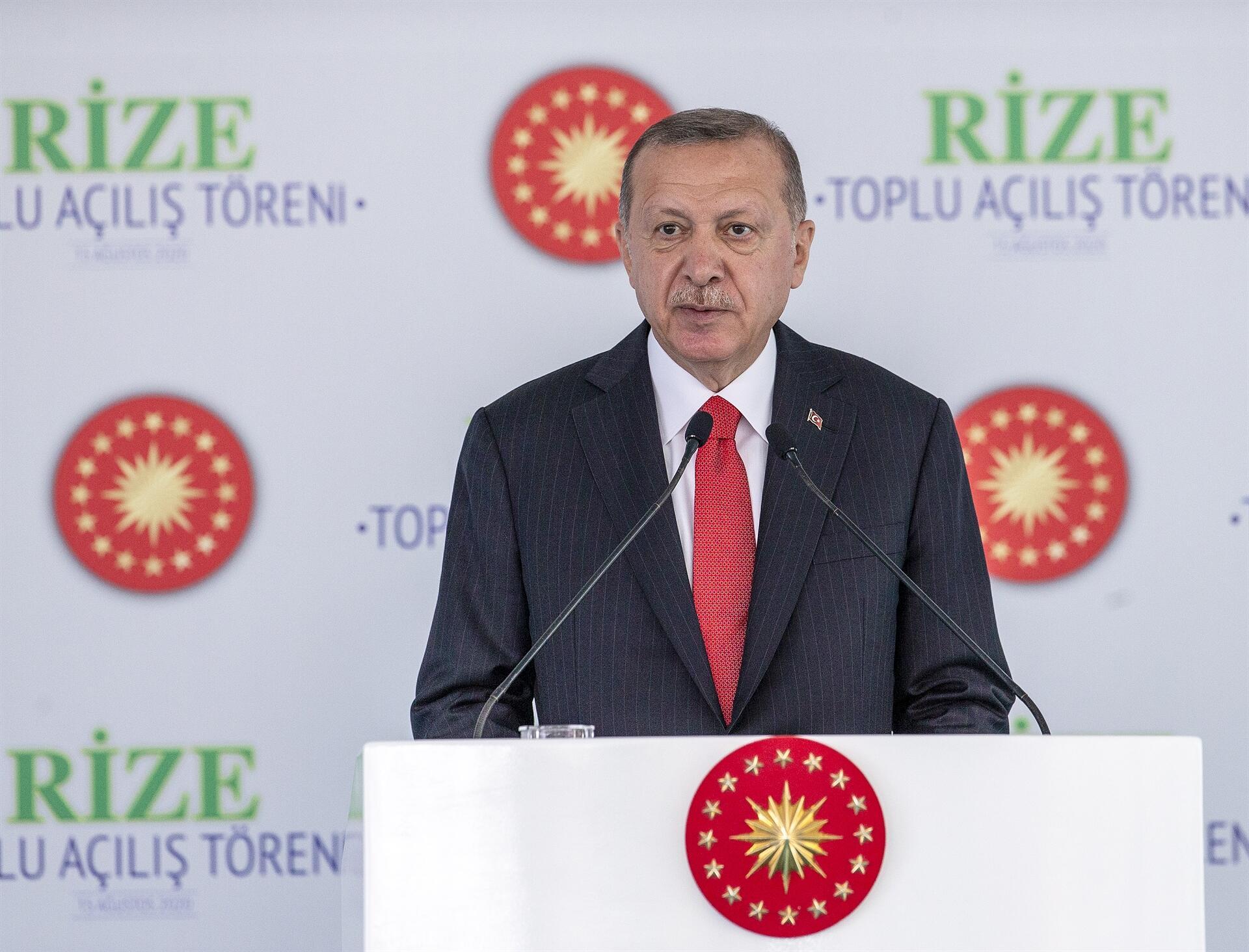

Turkey is fully focused on protecting its rights in the Eastern Mediterranean, Libya, and the Aegean, the nation's president said on Aug. 15.
Turkey is also focused on stopping terrorist groups in Syria and northern Iraq, President Recep Tayyip Erdoğan said in Rize on the Turkish Black Sea, speaking to the public and local members of his ruling Justice and Development Party (AKP).
"We're conducting the most comprehensive and successful operations in history against terrorist groups," he said.
Since 2016, Turkey has launched several cross-border operations in both northern Syria and northern Iraq to eliminate the YPG/PKK terrorists there who plan attacks against Turkey and try to set up terror corridors.
In its more than 30-year terror campaign against Turkey, the PKK – listed as a terrorist organization by Turkey, the U.S. and the European Union – has been responsible for the deaths of nearly 40,000 people, including women, children, and infants. The YPG is the terrorist PKK's Syrian branch.
"We're currently focused on achieving the rights and interests of our country in every field at the most advanced level all over the world," Erdoğan said, adding that this is Turkey's real agenda.
Erdoğan underlined that the country is also striving to fight the novel coronavirus pandemic and its fallout, as well as strengthening the Turkish economy.
Turkey has become a source of hope for all oppressed regions, including Palestine, Yemen, Syria, Myanmar's Rakhine state with its oppressed Rohingya, and Libya, he said.
Turkey's freedom of religion
Turning to Greece's mistreatment of the Turkish minority in the country, Erdoğan said: "Our expectation is that Greece acts sensibly, not as incited by others, and to put an end to policies akin to state terrorism, especially against our brothers in Western Thrace." Greece's Western Thrace region – in the country's northeast, near the
Turkish border – is home to a substantial, long-established Muslim Turkish minority numbering around 150,000.
Decrying attacks on Turks' mosques and schools in Western Thrace, Erdoğan said that Turkey, in contrast, spent five years renovating the ancient Orthodox Sümela Monastery in its Black Sea region, which recently restarted mass services.
"We have no problem with anyone over freedom of religion. Everyone in this country can live safely according to their faith," Erdoğan said.
Eastern Mediterranean
On Ankara's energy exploration in the Eastern Mediterranean region, Erdoğan said Turkey is fully justified in its exploration in terms of both international maritime law and established conventions.
Turkey will continue to defend its rights "using all its means," he said.
"Turkey will never bow to banditry on its continental shelf, nor will it pull back in the face of sanctions and threats."
"We will never hesitate to respond to the slightest harassment of our ship," Erdoğan said, adding that Turkey never seeks to stir tension or claim the rights of others.
He stressed that Turkey defends the rights of the nation as well as the Turkish Cypriots.
Erdoğan said the only solution to the dispute lies through dialogue and negotiation and urged Athens to respect Turkey's rights.
Turkey has consistently opposed Greece's efforts to declare an exclusive economic zone based on small islands near Turkish shores, violating the interests of Turkey, the country with the longest coastline in the Mediterranean.
'Turkey guards its legitimate rights, interests in E Med'
Meanwhile, the Turkish Foreign Ministry said on Aug. 15 that Turkey is protecting its legitimate rights and interests in the Eastern Mediterranean region, and the EU should focus on those taking unilateral and provocative actions in the region.
Responding to a statement from a Friday EU Foreign Affairs Ministers meeting reaffirming the bloc’s "full solidarity” with Greece and the Greek Cypriot administration, the ministry said on Twitter that Europe should take action against those who defy the rights of Turkey and the Turkish Cypriots.
Ömer Çelik, a spokesman for the AKP, also said Turkey would not make any concessions on Turkey’s "Blue Homeland," meaning its maritime borders.
Çelik said the threatening language of some actors is doomed to fail while those who pursue dialogue on a legal basis will prevail.
The "Greek drama" in the Eastern Mediterranean has no legal basis, and France is making "frivolous" statements, he added.
Arguing that Athens wants to turn its own policy into the EU’s, Çelik said French President Emmanuel Macron sought to cover up his failures in other issues through interference in the Eastern Mediterranean.
Vice President Fuat Oktay, for his part, said Turkey is trying to expand cooperation and diplomacy in its region, especially the Eastern Mediterranean.
Stressing that the Oruç Reis – a Turkish-flagged energy exploration ship – is resolutely operating within Turkish maritime borders in the Eastern Mediterranean, he said actors seeking to confine Turkey to its mainland are doomed to lose in the end.
|